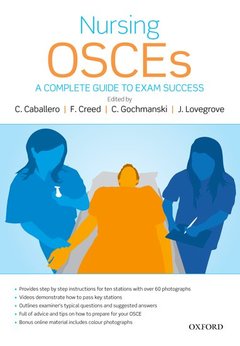Description
Nursing OSCEs
A Complete Guide to Exam Success
Language: English
Publication date: 01-2012
240 p. · 17.1x24.6 cm · Paperback
240 p. · 17.1x24.6 cm · Paperback
Description
/li>Contents
/li>Biography
/li>
In order to succeed in an Objective Structured Clinical Examination (OSCE), nursing students need to know not just what an OSCE involves, but how to undertake the skill correctly at each OSCE station. This book is a complete guide on how to prepare for an OSCE with step-by-step instructions for the ten most common OSCE stations that nursing students can face. Specific stations range from asceptic non-touch technique, communication and observations, to more highly pressured skills such as medication administration, resuscitation and assessing a deteriorating patient. Nursing OSCEs: a complete guide to exam success covers these skills and more in a clearly structured and concise way. Each OSCE chapter outlines: · Key revision material enabling quick and complete revision · Step by step instructions on how to perform the skill in an OSCE, · An example examiners marking sheet, so students know the criteria they will be measured against · Typical questions an examiner may ask and suggested answers · Common errors to avoid and top tips for success. With over 70 illustrations and videos of four OSCE stations, it demonstrates how to pass key stations. Bonus online material includes colour photographs and Powerpoints for revision at http://www.oup.com/uk/orc/bin/9780199693580/ This book is ideal for nursing students preparing for OSCE as well as for lecturers, mentors and practising nurses involved in student education.
Part I Process and preparation. 1. An introduction to OSCE assessment. 2. Overview of OSCE station. 3. Preparation for the OSCE assessment. Part II: Skills. 4. Interpersonal Communication. 5. Hand Hygiene and infection control. 6. Aseptic Non-touch Technique (ANTT). 7. Measuring, Assessing and Recording Pulse, Body Temperature, Respirations and Oxygen Saturation. 8. Measuring Blood Pressure. 9. Urinalysis. 10. Assessment of Medication Calculation skills. 11. Administration of oral medication. 12. Recognition of acute deterioration. 13. Basic Life Support (BLS. Final preparation. 14. Reflecting upon your OSCE.
Dr Catherine Caballero, DPhil, MSc, P.G.C.H.S.C.E, BSc, Dip Ns, R.N is a senior lecturer at the University of Brighton. Catherine has a Doctorate of Philosophy from the University of Oxford. She has a background in surgical nursing, specialising in day surgery and in 1995 was appointed as the first laparoscopic nurse practitioner in the U.K. Catherine's passion is in the development of clinical skills and her interests relate to clinical decision making, clinical skill development and mentorship. Fiona Creed MSc, BSc, R.N. is a senior lecturer at the University of Brighton. Fiona has a clinical background in general and neurological intensive care nursing and teaches acute clinical skills and post registration acute care nursing. Fiona is currently a PhD student at the University of Brighton where she is exploring clinical decision making during episodes of acute patient deterioration. Clare Gochmanski is skills laboratory technician at the University of Brighton. She is responsible for managing several skills labs across the university sites assisting with simulation teaching, programming simulators and assisting with student skills practice session. Clare organises and coordinates the OSCE examinations at the University. Jane Lovegrove MSc ,B Ed, R.N.T., RN. is a principal lecturer in clinical skills at University of Brighton. Jane's clinical background is in intensive care, cardiac surgery and coronary care. Her current clinical and educational interests are in grading clinical practice and using high fidelity simulation to assist students in clinical decision making.
© 2024 LAVOISIER S.A.S.
These books may interest you

Macleod's Clinical OSCEs 43.96 €

MFDS PART 2: 60 OSCE stations 65.01 €

OSCEs at a Glance 42.03 €

